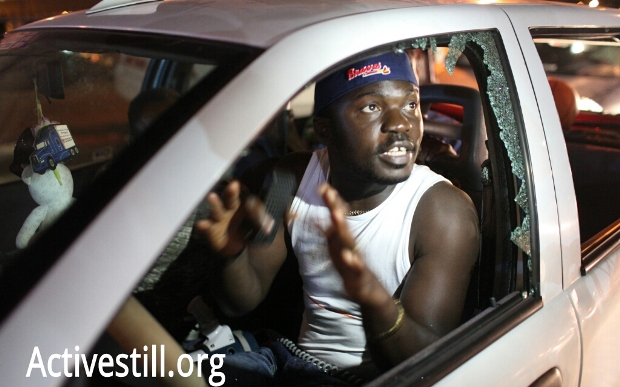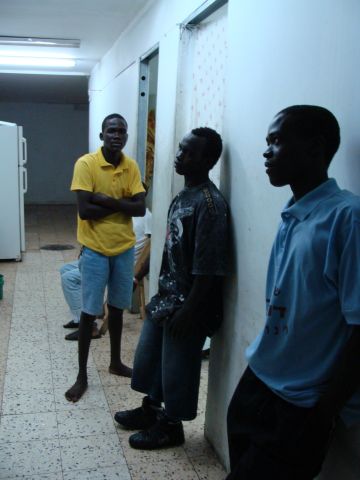Sudanese refugee Abraham Alu saw his parents killed by militiamen when he was just seven years old. He discusses life in Israel and how he ended up here. The latest installment of the South Tel Aviv Stories.
Abraham Alu, a 35-year-old refugee from what is now South Sudan, was on his way to the store last Wednesday night when an anti-African protest in south Tel Aviv turned violent. Jewish Israelis chased and beat African asylum seekers, broke the windows of a car full of African men, and smashed storefronts of African-owned stores in south Tel Aviv.

Alu, who was headed out to buy food, almost ran into a mob. But police pointed to the group headed in his direction and said, “Run, they’ll murder you! Run!” Alu turned around and headed back to the tiny, one-room apartment he shares with 11 other South Sudanese men.
Approximately 60,000 African asylum seekers currently live in Israel. While Sudanese and Eritreans are protected from deportation, Israel does not issue them work visas. The refugees scrabble together a living by working odd jobs. Many live in south Tel Aviv, a historically poor area of the city, where rent is cheap.
On a bright Sunday morning just days after the race riots, Alu stands on a busy pedestrian thoroughfare in south Tel Aviv. Many of the stores and restaurants on the strip are owned by or cater to Southeast Asian migrant workers or Africans. Both Israeli and foreign vendors line the edge of the cobblestone walkway, their wares spread out on sheets.
Alu, a tall man with broad shoulders, sells plastic boots. He stands behind them, as though he’s trying to put a barrier between himself and the world. “I feel afraid even right now,” he says, adding that he faces constant harassment from Jewish Israeli residents of the neighborhood.
“They come here and [say], ‘What are you doing here? This is our country, go home; go back to [Sudan].’”
“I left [South] Sudan when I was small because of the war and here, right now, I’m still in a war,” Alu says.

When Alu was seven years old, he saw both his mother and father murdered by militiamen. He fled his village alone. To this day, Alu does not know what happened to his brothers. Twenty-eight years later, he continues to search for his brothers by asking other refugees if they have met them or heard anything about them.
Alu eventually ended up in Egypt, where he worked odd jobs to survive. In Cairo, he joined a sit-in outside of the United Nations High Commissioner for Refugees to protest the conditions African asylum seekers face in Egypt. The 3000 demonstrators, who camped out for three months in late 2005, also asked for the UNHCR to help them move to other countries.
On December 30, 2005, approximately 4000 Egyptian policemen stormed the protest camp. They fired water cannons into the crowd, which included women and children, and beat demonstrators with batons. More than 20 Africans were killed, including a four-year-old girl. The Egyptian Interior Ministry said a stampede was to blame for the deaths, though media reports cast doubt on that claim.
Alu fled for Israel. Because he’d heard that the journey through Sinai was dangerous, he left his wife, two-and-a-half-year-old daughter, and infant son behind. He would send for them once he was settled somewhere and the situation was stable.
After he crossed into Israel in early 2006, Alu was held in prison for a year. He has been living in south Tel Aviv since he was released.
In the wake of last week’s violence, Alu says, “We have to move from [Israel]… but there’s nowhere to go.”
While Alu wants to go home and help build South Sudan, which has been independent for less than a year, he doesn’t feel that it is safe to return.
A shopper stops and picks up a pair of black work boots. He asks, in Arabic, how much the shoes cost and Alu answers, “Eighty shekel.” The man clucks his tongue and says he can give Alu 70. Alu explains that he buys them for 70 a pair and only makes a 10 NIS profit. As the potential buyer—a young man with short dreadlocks—starts to leave, Alu calls after him. “I’ll give them to you for 75.” The man walks on.
Alu gestures to the shoes. “Where is my future? Where is my future? This is my future?”
“I want to be somebody who will do something in the new country [of South Sudan]. But when I go back, I [will] have no money, no education, no nothing. Just me and myself, me and the few clothes I will put in a plastic bag.”
Asylum seekers, Alu adds, “don’t want to be rich. No, we are [a humble] people. We just want something to eat, we want to sleep well, to feel secure—that’s it.”
When Alu is scared, he imagines his home in South Sudan, despite the fact that he hasn’t seen it in almost three decades. He smiles for the first time in the half an hour we’ve spent together. “I’ll go and sit under my tree there.”
His father was a farmer, Alu explains, and the family had banana and mango trees. There was one particular mango tree that Alu loved. “Yeah, I remember my tree. I think about it a lot.”

